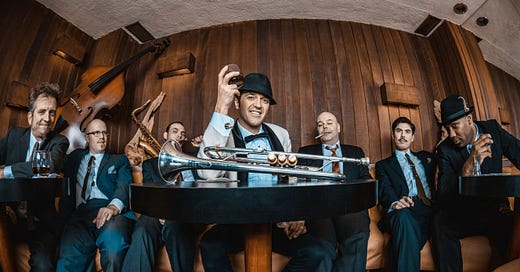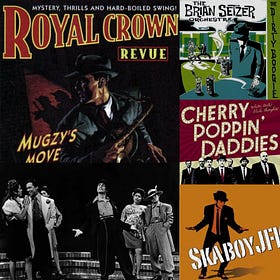Steve Perry of Cherry Poppin' Daddies | Interview
''Our artistic mission is fraught with danger. A lot of people want to hijack the message to suit themselves. In the process they water it down and simplify it.''
A couple of weeks ago, I wrote about the Swing Revival of the 1990s and it`s significance in Swing Revival of the 1990s: When Punk-Rock and Grunge Just Didn't Do It Anymore. I mentioned that grunge and rap were one the biggest factors in instigating the swing movement and that the movement had punk rock & Do-It-Yourself roots. One of the bands that I talked about and who are important in 90s music history is Cherry Poppin' Daddies. Here is an interview with frontman Steve Perry of Cherry Poppin' Daddies about politics, signifyin’, grunge and the importance of music.
What do you think about musicians that use their music to publicly support a politician, or political party or a specific ideology? Do you think musicians have the power to influence events like elections?
SP: You asked the question as “use their MUSIC to publicly support” as opposed to platform, which are two different things, of course. The way I think about using music is to present ideas in the context of an album or even at this point as a body of work. My albums are for the most part conceived as 12 songs or so of wildly different genres and themes that fit together as a concept in my mind. So its like a mural with a bunch of different character sketches that sound completely different. If I address politics in some of those songs it tends to be not directly. Like on our new record there is a song that is called “Shooting Bullets at a Bell” It kind of obliquely addresses the assault on our democracy by autocratic forces, but from the perspective of a cynical member of the polity who is alienated from the whole horrid process they see unfolding. He sees himself as Simeon Stylites atop a column laughing down on the ants of his fellow citizens as they wreck 250 or so years of democratic ideals. His shitty attitude is all represented in symbol form (Bell, Philadelphia, organized crime, Sherlock Holmes, Bix Beiderbeckes horn sound, wisdom teeth removal) so oblique references. Most audience members will not know or care what I am on about. Other times I will be so straightforward that the audience will have no idea whether I am being ironic or not (see White Man on Bigger Life). I am trying to be overall to be understood on a level that is below consciousness and is slippery and fractal. I want the nuances of being alive to be felt. Consciousness and spirit is all grey.
I think artists are able to open up worlds that people have been hitherto unable to see, but in the music itself I think very few people are listening to the words much less engaging with a complex web of ideas. But perhaps in the realm of celebrity and platform someone relatable may be able to influence elections. But someone like myself who is by nature very outside the mainstream only elicits criticism and trolling for the most part. I am not likable or relatable like say Taylor Swift. And I am not shooting for that.
In the 80s and 90s did you face any issues of censorship or was the music scene, or industry limiting?
SP: Yes the very formation of the band was in the context of this kind of a trolling, virtue signalling culture. The entire punk rock/alternative scene, especially in the PNW was predicated on excluding basics/normies from the scene. You named your band the Butthole Surfers to signal to your tribe that this was for them not for Susie Creamcheese and Chad with his pink Izod draped over his shoulders. Signifyin’ is a term of academia now described by Henry Louis Gates, in The Signifying Monkey in regard to African American jazz artists of the 20th century as a kind of encrypted speech to bypass white culture and land full force on its intended audience African Americans. Because I was interested in jazz of this era I was also interested in signifyin’. So we walked a tightrope of appealing to a hopefully like minded audience and the segments of society who would try to redirect our art to serve their own agendas which usually had to do with their own narcissism.
Our artistic mission is fraught with danger. A lot of people want to hijack the message to suit themselves. In the process they water it down and simplify it. We necessarily have to be brought low in order for them to shine in their moral higher ground. Nowadays you see this everywhere. So as an artist you need to know this is going to happen going in and hopefully hoist a few of these Karens and Kyles by their own petards. But it’s fun knowing how they are going to react and observing them doing exactly what you plan, I feel like it adds to what the art was trying to say in the first place. Another layer of strategy… 4D chess.
Is there a certain musical genre, decade or movement that you think must be learnt more about in schools and Universities? Are there any important lessons that alternative music forms teach?
SP: If I taught a Humanities course on music history I would try to trace proto movements or the ways that certain historical movements evolve into each other. For instance the glam glitter rock moving into Punk (you could argue that the Ramones are just another Glam band with a slightly different gimmick where is the line?) or hot jazz moving into Swing. It seems in the space between the various periods that things are free and more exciting. There are more inputs into what went into say Fletcher Henderson's band in the late 20’s in NYC when he was playing Club Alabam and Louis Armstrong showed up from Chicago. Paul Whiteman (because racism) was allowed to be influenced on recordings by classical music but black artists, like Henderson, were only allowed to record blues. However, in their live shows, Hendersons band fully took influence from all sorts of classical sources. The music was kind of art deco mish-mash and wilder than it would be later on during the point where Swing was codified. I like the moment when the glass hasn’t left the table yet to smash on the floor, but isn’t quite sturdy on the table top, instead it's purchased just on the edge. That’s what gets me up in the morning.
Do you think that contemporary mainstream music lacks something or has some problems (marketing, creativity, meaning, values or technology etc.)? If so, what is the main problem that needs to be solved and how?
SP: Well I hate music that isn’t body music. I like the music to feel visceral, human, wild and free. A lot of that kind of thing happens in the rhythm section. The rhythm section, when it is really choogabooglin’, is a force for humanity. When the bass is just a low end generator, maybe just hitting on the 1 and the and of 3, that to me signals the coldness and sociopathy indicative of the Caucasus, if you catch my drift. It bores me and feels evil. I only trust music with an ass. I don’t know if that kind of humanity can be taught. Can you teach someone to dance? Dunno.
Looking back at the popularity of swing revival in the 90s and your own music, is there something that you would do differently now?
SP: I tried to inspire a subculture back then, a sort of adjunct to the pre existing alternative scene or punk rock scene. But it got overwhelmed by music and dancers that were solely content to mimic the old sources and didn’t care about trying to generate new music and dance based on those forms. They ruined it and won the day. Again I think its the narcissism and coldness of these people who signal to each other for Brownie points that fuck any progress. It was inevitable because the majority of people are like this. Content to cosplay.
Do you think that the grunge scene was limiting in any way? Are there any bad and good aspects about this music?
SP: At the time it was a bummer to see the PNW scene sullied by its exposure to the rest of America. I mean Kurt hated it so much because he lost his home which were his bearings from which he looked out at the world. Corporations only have one thing in mind and it ain`t art. So he struggled as he circled the drain. I think his idealism and youth got him. It was tragic. Musically some of the music had ass and fighting spirit so I liked that. We played with a lot of those bands coming up especially in Seattle (like at Washington Hall and the Central Tavern) and Portland (Satyricon) and the scene in its early days was more amorphous and accepting as far as genres were concerned. I definitely was trying to provoke from inside. We had tatted up tough flapper chicks that would dance on stage then stage dive into the audience. We were trying to say there is not only one way to do this. But as usual we were too strange. We did make it into Singles as a visual joke, however.
There`s a life principle that “You need to try everything because you only live once”. Are there things that you will never do or try? Is there anything you would lack courage to do?
SP: I think we should try to flourish as much as possible with our own individual wirings. There is no need to try everything. Although if there ever was someone who is interested in a lot of stuff it's me. I lack courage in the sense that I am not foolhardy and have no interest in risks just to show off. I never want to hurt other people or try to impose my point of view on them just because I see things so radically differently. I will put it out there and if they want to engage then great.
Mostly I believe that life is a struggle and I am in control of my choices and how I feel about myself. I am trying to train myself to be a better version of myself every day. All on my own weird terms.
What would be your message to the younger generations?
SP: Be yourself. Work as hard as you can. Loving and doing stuff for other people will make your life complete and you will flourish. Selfishness just ends up sad and bored.
Just like music, reading daily exercises the brain, improves sleep and reduces stress, so why not read some more?! Check this out:
Swing Revival of the 1990s: When Punk-Rock and Grunge Just Didn't Do It Anymore
‘‘(Swing jazz) is good music for punk-rockers who have grown tired of the physicality of moshing and slam dancing’’- Daniel Glass, Royal Crown Revue (Vice, 1997) Called retro swing and neo-swing, this music is a fusion of swing, jazz, blues, rock, punk and ska. You can hear this in the music of Lavay Smith & Her Red Hot Skillet Lickers, The Brian Setzer…






